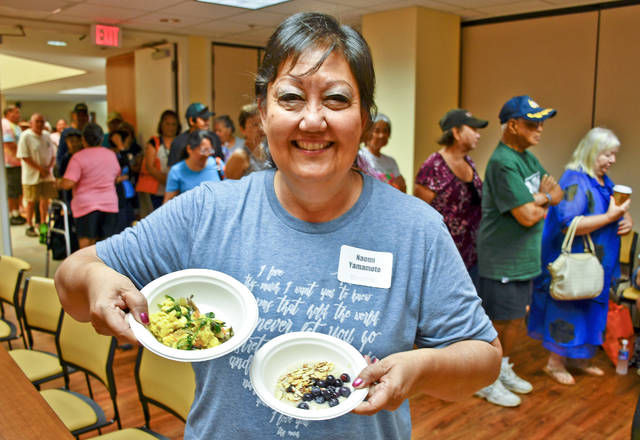LIHUE — Josephine Tsukamoto knows what it’s like to live with diabetes. “It’s hard. It’s everyday living — you have to make sure you eat three times a day and test your blood sugar,” she said. Tsukamoto, who lives in
LIHUE — Josephine Tsukamoto knows what it’s like to live with diabetes.
“It’s hard. It’s everyday living — you have to make sure you eat three times a day and test your blood sugar,” she said.
Tsukamoto, who lives in Kapaa, has been living with diabetes for 40 years.
One of the hardest parts of adjusting to diabetes is making time during the day to address it, she said.
“You get lost when you’re working and tend to forget,” she said.
Another challenge was finding the right food to eat, she added.
“It took some time to learn a different diet,” Tsukamoto said. “It’s like learning how to eat again.”
Tsukamoto was one of about 80 people who showed up for the first annual “Diabetes 101: A Healthier You” workshop, hosted Saturday by Wilcox Medical Center.
“Every year we do a community health needs assessment, and this year, we realized diabetes needs to be addressed,” said Faith Campbell, spokeswoman for Wilcox.
There is a large portion of people on Kauai who suffer from diabetes, or who are pre-disposed to the disease, Campbell said.
“So we wanted to have education and support for that community,” she said.
The event was kicked off with a walk around the block with Dr. Anne Dempsey from Wilcox Medical Center.
After getting their exercise, attendees listened to discussions led by Wilcox Medical Center doctors, participated in activities like tai chi and chair exercises, and got a wellness checkup, which tested blood glucose, blood pressure, vision and diabetic foot.
Between the scheduled events, participants browsed through different booths headed by various health care agencies like HMSA, Kauai Community College Nursing and the University of Hawaii College of Tropical Agriculture and Human Resources.
Uma Chaluvadi, a Kauai opthamologist and member of the Kauai Master Gardner Program, was at the CTAHR booth, teaching the basics of gardening.
“A lot of times, people are unnecessarily intimidated by growing their own vegetables,” she said. “I want to help people get in touch with their inner gardener — we all have one.”
It’s especially beneficial for people with diabetes to grow their food because it is physically and mentally therapeutic, she said.
“Gardening is good for the soul and body,” Chaluvadi said. “Gardening can help people de-stress, and they get exercise while doing it.”
Alia Melandish said she attended Saturday’s workshop to learn about diabetes so she can take care of her parents.
“They took care of me for so long, it’s my turn,” she said.
Melandish, who lives in Anahola, was impressed by the amount of resources available Saturday.
“There’s a lot of great information, and it’s a way for me to educate myself,” she said.
Dempsey, who led a discussion on preventing diabetes, said the key is healthy eating and exercise.
“Lifestyle changes are better than medication and help decrease people’s risk of diabetes,” Dempsey said. “You can change your life based on your lifestyle. You can change the trajectory of your health based on what you eat and how you exercise.”
Dempsey suggests exercising for 150 minutes a week.
“You don’t have to go out and do P90X or Insanity — you can go on a brisk walk or vacuum, just as long as you are active,” she said.
The best thing people newly diagnosed with diabetes can do is educate themselves, Tsukamoto said.
“Take time to go to classes and talk to people who have it,” she said.




